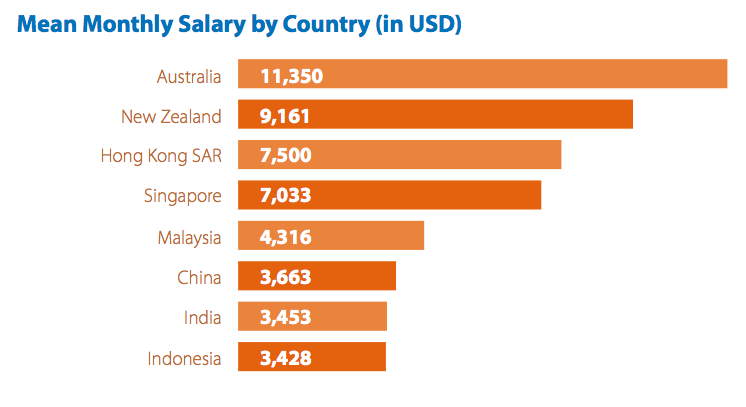Australian project managers earn top salary in Asia-Pacific
Results from a survey conducted by ESI International reveal that Australian project managers are the paid the highest salaries in the Asia-Pacific region.
The ESI International Asia-Pacific Project Management Salary Survey, which spanned countries from China, Hong Kong, India, Australia and New Zealand, as well as Southeast Asia including Singapore, Malaysia and Indonesia, shows Australian project managers taking home an average of US$11,350 per month compared to second place counterparts, New Zealand project managers, who earn an average of US$9,161 a month.
Asked if they expected a rise in salary—apart from annual increment and bonus payouts—in the next year, most said they did not, with 44% indicating a ‘Better economic outlook’ would help their chances and 31% choosing ‘Increased PM responsibilities’ as another reason to angle for a pay rise.
As well as salary trends, the survey looked at education and skill factors for project management professionals. Of the 600 respondents, 73% held a qualification or certification of some description, the most popular being Project Management Institute’s (PMI) PMP, held by 27% of respondents, followed by the Information Technology Infrastructure Library (ITIL) qualification, held by 15%.
The skills that count
ESI International also looked at project management across different industries, asking ‘What are the top two core competencies that you think you will need to fast-track your career?’ Across the board, ‘Project leadership’ topped the list with 23%, although almost one in three of those in the oil and gas industry indicated this as a critical factor.
The second most popular choice was ‘Communication and general management skills’ at 18% with ‘Stakeholder management’ a close third at 15%. Close to one in five project managers in the finance industry also rated ‘Agile project management’ as a skill that would enhance their career.
The report stated: “It is interesting to note that technical or hard skills such as Agile, problem solving and change management were ranked by respondents across most industries as of lower importance to their careers. The finding is indicative of a general sentiment among PM professionals in Asia Pacific that business soft skills are more crucial for career development and more valued by employers than technical skills, especially for middle- to senior-level positions.”
Organisations can benefit by assisting project managers with advancing their careers. Here are ESI International’s recommendations:
- Improve PM competencies through PMOs: Project managers in organisations with a designated PMO tend to obtain more structured training and are better equipped with both technical and soft skills.
- Develop specialised training to manage increased responsibilities: Increased job responsibilities can be handled effectively if the employee skillsets are improved through specialised training.
- Commit to continuous performance improvement: Experienced project management professional require new competencies, particularly in project leadership, communication and general management skills, as these critical business soft skills are most sought after by employers for senior functional roles.
- Implement talent strategies to drive development and retention: Project organisations across Asia Pacific should focus more on developing the talent they already have given the current shortages of experienced project managers.
- Drive business value through learning investments: Staffing challenges faced by organisations today are best addressed by developing talent internally rather than hiring from the outside. Training new graduates, for instance, has demonstrated a yield of over 500 per cent return on training investment.
To download a PDF copy of the report, visit ESI International Asia Pacific Project Management Salary Survey 2014


